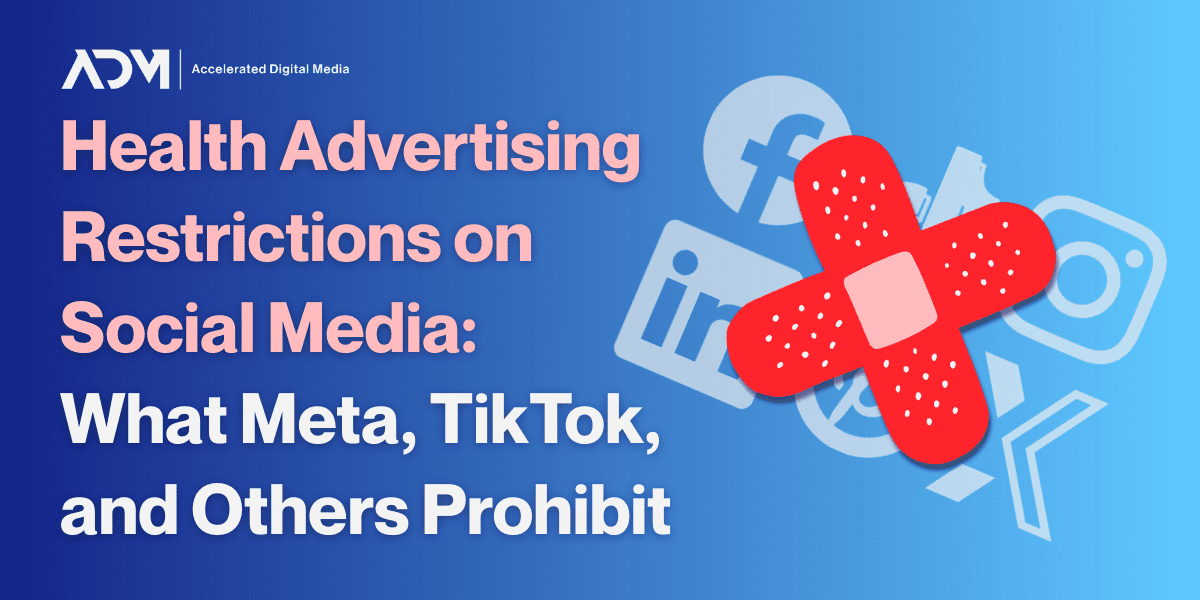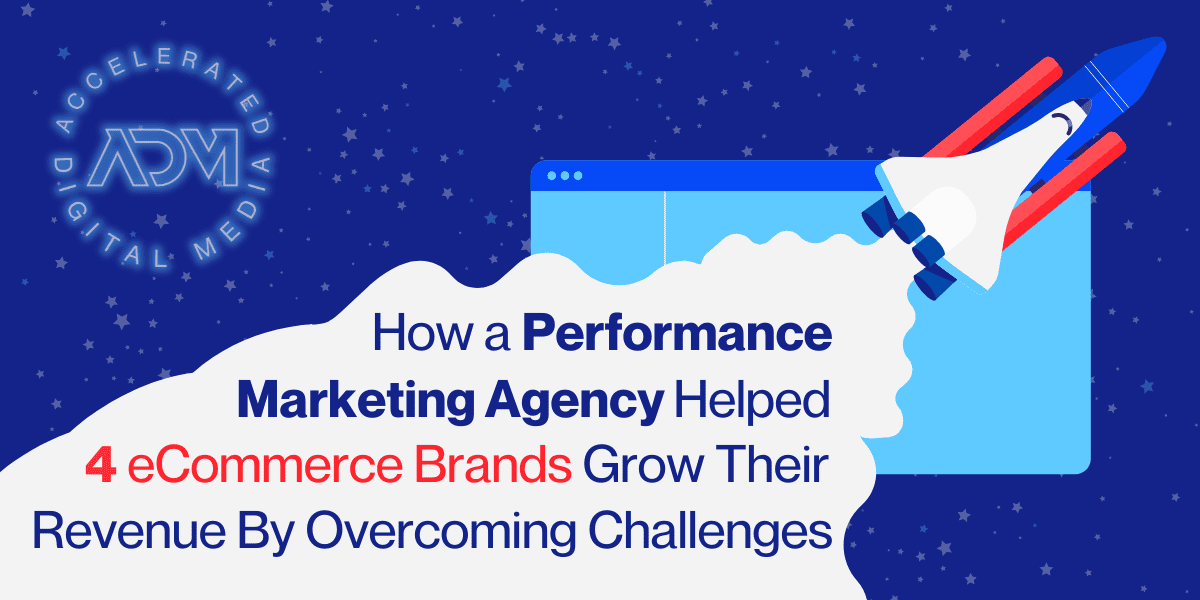Your patients spend plenty of time on social media, and the bulk of their scrolling power is still dedicated to Facebook. It’s therefore no question that your D2C digital health brand needs to be present on all of Meta’s platforms.
However, Meta has stringent health and medical advertising policies to keep users safe and remain compliant with healthcare privacy laws. And, when it comes to social media advertising, the last thing you want is to lose access to the Facebook advertising Goliath. This is easier said than done for digital health and wellness companies promoting their products or services. Despite best intentions, your ads still may be kicked back — with consequences varying from minor to severe.
We help digital D2C health brands navigate Meta’s stringent medical advertising rules. In this article, we’ll apply and share this knowledge to help you promote your health and wellness products via paid social advertising. We’ll also share five best practices to keep your ads on Meta’s good side.
Facebook Ad Approval Stakes are High
Any time your Meta ads are disapproved or your account is restricted, you lose an irreplaceable marketing tool—which can mean you lose money. Two scenarios prompt Meta ad reviews:
- You create a new ad
- You make changes to an existing ad
Facebook claims to review most ads within 24 hours. Some ads are approved in minutes, while others can take days. Behind the scenes of the review process is a mixture of people and AI. While Facebook says they mostly rely on automated ad reviews, they do also use human reviewers “to improve and train our automated systems and, in some cases, to review specific ads.” Should your ad be disapproved, you’ll be routed to a human re-review.
To catch such disapprovals when they happen, keep constant tabs on your ad’s approval status. If the Meta platform’s automated review initially approves your ad, it might still be disapproved later through human review. Ensuring your ads stay well within Facebook’s advertising policies is advisable.
If you have additional live ads that are also generating efficient marketing results, the impact of having a single ad disapproval can be minor. However, there are more serious scenarios. For example, when launching a new product or service line, if your ads are disapproved, your launch will not go live. Or, if you have a collection of ads that are driving valuable results and they are all disapproved (after previously running because they made it through the AI review), you hit a roadblock in generating those results until additional reviews and edits take place. Meta can take up to 48 hours to rereview your ads, costing precious time and money. If you show a trend of continually breaking the rules, or if the review deems your infraction especially egregious, Meta may even take further action, such as disabling, restricting, or revoking your account.
There are, of course, best practices that increase your ad approval chances. Let’s dive into how you can set your brand up for success.
Tips for Facebook Ad Approval
1. Know The Rules
Whether you are managing your paid social strategy or partnering with an agency, your ad manager must know and understand Meta’s ad rules and policies, especially related to health and medical marketing. Very specific policies may apply depending on the product or service your D2C health brand offers. For example, there are specific Meta policies around advertising for prescription drugs that an advertiser needs to be well versed in. We’ve linked a few below.
- Strengthening Our Ad Policies and Enforcement Around Prescription Drugs
- Online Pharmacies Rules/Regulations
- Prescription Drugs Rules/Regulations
Be aware that Facebook describes their advertising policies as “a living set of guidelines” and their standards are subject to change rapidly.
2. Leverage Expert Experience
The best way to avoid Meta ad disapprovals and account penalties is to proactively prevent them from happening. It takes time, and some trial and error, to expertly navigate the complexities of digital health social media marketing. You can skip the learning curve by hiring a digital health marketing agency with proven expertise in Facebook advertising.
3. Know the Ad Elements Meta Will Review
There are five specific components of your ad that Meta will review for adherence to their policies:
- Images: in addition to Meta’s unique image requirements for health ads, there are also image size, width, resolution, and file type considerations. Meta completely restricts the following images:
- Blood tests
- X-rays
- Skin conditions or open wounds
- People in hospital beds
- Photos that could be considered gory or graphic
- Internal organs
- Images of people taking medication
- Before and after pictures
- Text: For text in your graphics, Meta recommends a modern, clean font that doesn’t obstruct your ad visuals. In ad copy, use a single call-to-action and don’t mislead or exaggerate claims.
- Targeting: You cannot target minors when advertising cosmetic procedures or wellness products. Nor can your targeting imply knowledge of any sensitive personal health information among users of any age.
- Placement: Meta will also review where you place your ads (whether they appear on Facebook, Messenger, Insta, and/or Meta Audience Network).
- Landing page content: All ads must point to functional landing pages with copy that accurately reflects the advertised product and does not violate Meta’s Personal Health and Appearance Advertising policy.
4. Avoid Obvious Missteps
Not only must your ads not imply knowledge that a user has certain personal attributes, but Meta will disapprove any ad that implies or attempts to generate negative self-perception in order to promote diet, weight loss or other health-related products. Meta’s Business Help Center details this policy with example images and explanations.
To stay on the safe side, focus on the positive change and value your D2C digital health brand provides rather than the problem or challenge it is trying to solve. Speak about your brand and generalized health conditions more than your speak about specific treatments or pain points.
5. Know What To Do When An Ad Is Disapproved
Despite your best intentions, your ads may still be disapproved. Be aware that Meta’s re-review process can take up to 48 hours (sometimes more). You need to get campaigns back up and running as quickly as possible, so as you triage the situation, we recommend you:
- Edit your ad: Sometimes, a simple tweak in language or an easy image swap makes all the difference. Also, check for any typos, broken links, or inconsistent landing page copy. Republishing your ad will kick off the re-review process.
- Appeal Meta’s decision: You can manually request your ad be re-reviewed, essentially appealing your case. You must provide your analysis in a written statement and can attach screenshots to illustrate your point. If after your initial appeal your ad still hasn’t passed, you can submit a last resort manual ticket, asking to be connected with a Facebook representative.
Creativity Wins the Day (and the Ad Approvals)
To successfully market health and wellness products via Meta requires creativity and flexibility. You must understand all the rules and policies so you know how to comply while still reaching your patients.
When you hire an agency with proven experience in digital health paid social advertising, you take the guesswork out of the Meta ads approval process. Accelerated Digital Media gives you all of the resources you need for successful social campaigns. Our experts are all Meta-certified, with comprehensive knowledge of the Personal Health and Advertising rules and the ad review and approval process. We bring this knowledge plus years of industry experience to your account, and we’re proud of the the results we deliver for our clients.
Health and wellness advertising on Meta platforms can be a complicated pursuit. Trust ADM’s expert team to help steer you away from ad disapprovals and toward more patient engagement and sales.
DISCLAIMER
This content is for informational use only and is based on analysis of current platform policies related to health advertising. These policies are subject to change following this publication date. If you require legal advice about any of the matters discussed above, ADM recommends seeking a healthcare privacy attorney.




